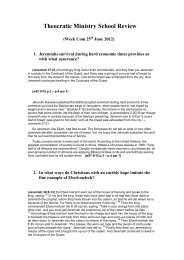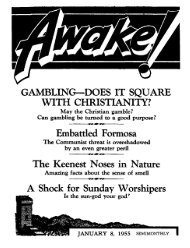1964 Awake! - Theocratic Collector.com
1964 Awake! - Theocratic Collector.com
1964 Awake! - Theocratic Collector.com
Create successful ePaper yourself
Turn your PDF publications into a flip-book with our unique Google optimized e-Paper software.
fore Magistrate Dickey on June 14, 1963,<br />
and the priest was acquitted. When he told<br />
his story in the witness box he qualified<br />
his threats a little. "I didn't say they would<br />
give you a licking: I said they might give<br />
you a licking: they might receive you with<br />
a teakettle." He also swore there were not<br />
five men with him: only four! Magistrate<br />
Dickey took the view that because the<br />
word "might" was used in the priest's <strong>com</strong>ments,<br />
and there were four men, not five,<br />
this made a difference and so there was<br />
no real threat of violence.<br />
Appeal was then taken to the County<br />
Court, and the case came on for. a new<br />
trial before His Honor Judge Dowell on<br />
December i3, 1963. Mr. and Mrs. Balaski<br />
recounted the story of the tirade from the<br />
priest, Adolph LeBlanc. It was explained<br />
further that they had thereafter left<br />
Wedgeport in their car and had been followed<br />
by LeBlanc and his five men for<br />
three and a half miles.<br />
The priest then entered the witness box<br />
to make his defense. He began by explaining<br />
that all the people in Wedgeport were<br />
members of his church and he was the<br />
parish priest. Such evidence could only be<br />
relevant if the fact of a Catholic majority<br />
placed the priest above the law. Judge<br />
Dowell quickly showed his view of such a<br />
contention, stating, "There is no necessity<br />
putting that on the record, it doesn't matter<br />
what religion the people are. This is<br />
part of Canada and the Criminal Code applies.<br />
These people had a perfect right to<br />
go to Wedgeport. I must determine if they<br />
were threatened. It doesn't matter what<br />
religion the people are. Strike those answers<br />
from the record."<br />
Respecting the threats, the priest partially<br />
denied them. According to him, he<br />
did not say, "They will beat you up," but<br />
admitted he did say, "They might give you<br />
a licking and I will pay their fine." He also<br />
denied having five men with him; it was<br />
JUNE 8, <strong>1964</strong><br />
only four. Judge Dowell remarked: "I wonder<br />
how much difference that makes! Four<br />
men and the priest is five: five men and<br />
the priest is six. Mr. Balaski was alone<br />
with his wife. It seems to me one man<br />
could get just as bad a beating from five<br />
as from six."<br />
Priest LeBlanc was questioned about the<br />
four men he admitted having with him.<br />
Why had he needed them? "To be witnesses."<br />
While he pretended the men were<br />
there as witnesses, the case was tried<br />
twice, once before the magistrate and a<br />
second time before the" County Judge, but<br />
he never at any time called any of the<br />
alleged witnesses.<br />
In summing up the case, counsel for the<br />
priest relied mainly on the fact that he had<br />
used the word "might."<br />
Counsel for Mr. and Mrs. Balaski pointed<br />
out that adding the word "might" really<br />
made no difference; that even if the judge<br />
accepted every word the priest said, he<br />
would still have to be convicted. His evidence<br />
was tantamount to a plea of "guilty."<br />
It was pointed out that he had admitted<br />
his W1lawful purpose of forcing the Balaskis<br />
to leave the municipality against their<br />
will. He admitted having with him four<br />
men, who were really a weapon of violence<br />
in his hands to ac<strong>com</strong>plish his unlawful<br />
object. By illustration it was pointed<br />
out that if a bank robber were holding up<br />
a bank and he pointed his gun at the teller,<br />
saying, 'Give me that money or you might<br />
get shot,' while holding his weapon of violence<br />
in his hand, he would not escape responsibility<br />
for his unlawful act by throwing<br />
in the word "might." The four men<br />
were a weapon of violence like a gun. Similarly<br />
with the argument about the five or<br />
four men: if a bank robber were accused<br />
of holding up a bank with a .45 revolver,<br />
could he escape from the charge of robbery<br />
by showing the weapon he used was a .22<br />
revolver instpwi of a .45? It was still a<br />
13




